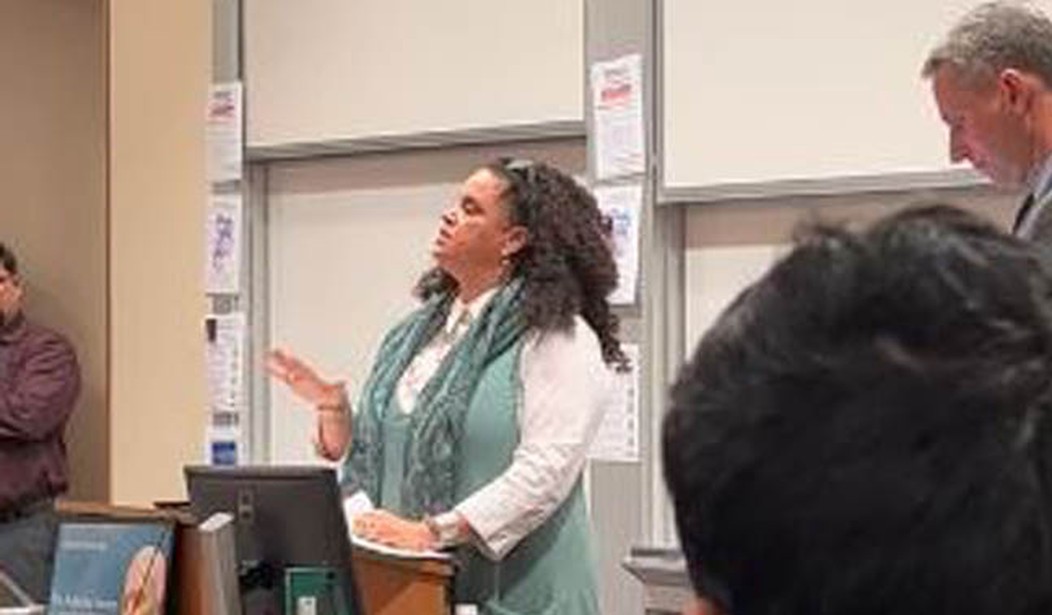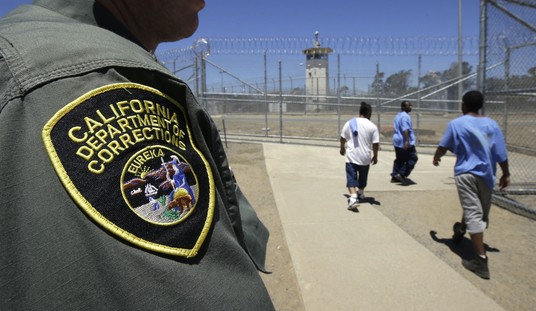Is the juice worth the squeeze? Apparently, Stanford’s DEI Dean Tirien Steinbach has decided it’s not. Back in March she helped students berate Judge Stuart Kyle Duncan. Yesterday she announced she was resigning.
A Stanford Law School diversity official resigned Thursday after being suspended in March for aligning with student hecklers who shouted down a former President Donald Trump appointed judge trying to give a talk.
Tirien Steinbach, the law school’s associate dean for diversity, equity and inclusion, made national news when she was recorded on video March 9 telling federal appeals court Judge Stuart Duncan that his work had “caused harm” to students.
Stanford Law School Dean Jenny Martinez posted a letter about Steinbach’s departure “to pursue another opportunity.” It reads, “Associate Dean Steinbach and I both hope that SLS can move forward as a community from the divisions caused by the March 9 event.”
Stanford Law announces Tirien Steinbach will leave her post, months after she appeared to facilitate a shoutdown of a 5th Circuit judge, leading Stanford to overhaul its free speech practices. pic.twitter.com/WkOIFpDEgx
— Alex Morey (@1AMorey) July 20, 2023
If you’ve forgotten how all of this happened from the beginning, Judge Duncan was invited to speak at the Law School by the school’s chapter of the Federalist Society. Student protesters arranged to protest and heckle him. This was anticipated but Judge Duncan expected they would eventually quiet down enough for him to speak. That didn’t really happen. It was during this disruption that Dean Steinbach came forward to restore order. She had a pre-written speech in which she asked Judge Duncan to consider not speaking because of the harm it would cause to students. She specifically asked him to consider if “the juice is worth the squeeze” and suggested it probably was not.
After Dean Steinbach finished her speech many of the protesters left the room. Judge Duncan tried again to give his speech but the hecklers wouldn’t let him. He finally gave up and moved on to a Q&A. Finally, Judge Duncan was escorted out of the building by two US Marshals. Later, Judge Duncan gave several interviews and didn’t hold back.
Law student Tessa Silverman, who attended the protest, told Reuters that Duncan himself appeared angry and called some students “idiots,” something Duncan acknowledged and repeated during Reuters’ interview.
“They are idiots,” he said. “They are hypocrites and they are bullies.”
He also criticized a Stanford official, Tirien Steinbach, the law school’s associate dean for diversity, equity and inclusion, who in a video of the event posted online by the conservative publication National Review addressed him and the crowd before the judge spoke…
“In my view, this was a setup, she was working with students on this,” he said.
At the same time, Dean Martinez issued a memo criticizing what happened and defending free speech without promising to hold anyone involved accountable. She also apologized to Judge Duncan. The students were unhappy about the apology and held a silent protest in Dean Martinez’ classroom.
The embattled dean arrived to the classroom where she teaches constitutional law to find a whiteboard covered inch to inch in fliers attacking Duncan and defending those who disrupted him, according to photos of the room and multiple eyewitness accounts. The fliers parroted the argument, made by student activists, that the heckler’s veto is a form of free speech.
About two weeks after the speech was shut down, Stanford announced that Dean Steinbach was on leave and that students would get mandatory free speech training (which they clearly needed). Dean Martinez did a good job explaining why the student protesters were wrong.
Some students have argued that the disruptive protest of the event was itself constitutionally protected speech. Of course, protests are in some instances protected by the First Amendment, but the First Amendment does not give protestors a “heckler’s veto.” As First Amendment scholar Dean Erwin Chemerinsky has written, “Freedom of speech does not protect a right to shout down others so they cannot be heard.”…
To the contrary, settled First Amendment law allows many governmental restrictions on heckling to preserve the countervailing interest in free speech. As the California Supreme Court stated in In re Kay, 464 P.2d 142, 149 (Cal. 1970), “the state retains a legitimate concern in ensuring that some individuals’ unruly assertion of their rights of free expression does not imperil other citizens’ rights of free association and discussion.”…
The “nature of a meeting” in an indoor university classroom, under settled First Amendment law, does not countenance the same sort of “prolonged, raucous, boisterous demonstrations” that might be acceptable at an outdoor rally, see In re Kay, 464 P.2d at 150. Rather, different “customs and usages” apply in a setting like a planned lecture in a reserved room on campus. In such a setting, limiting audience participation to signs, questions during a planned Q&A, and a non-disruptive level of audience reaction is appropriate to the nature of the forum. Stanford’s event disruption policy gives attendees a right to hold signs and to demonstrate disagreement in other ways as long as the methods used do not “prevent or disrupt the effective carrying out of a University function or approved activity, such as lectures, meetings, interviews, ceremonies. . . and public events.”…
The President of the University and I have apologized to Judge Duncan for a very simple reason – to acknowledge that his speech was disrupted in ways that undermined his ability to deliver the remarks he wanted to give to audience members who wanted to hear them, as a result of the failure to ensure that the university’s disruption policies were followed…
There are fundamental issues to consider here beyond the issues of formal law and university policy. They have to do with choices for which all of us are responsible in building a community dedicated to learning and to preparation for the practice of law. With regard to the norms of this community, the cycle of degenerating discourse won’t stop if we insist that people we disagree with must first behave the way we want them to. Nor will it stop if we try to shame each other into submission (shaming, the research shows, has precisely the opposite effect in communities constituted by difference). The cycle stops when we recognize our responsibility to treat each other with the dignity with which we expect to be met. It stops when we choose to replace condemnation with curiosity, invective with inquiry. I remain dedicated to cultivating these norms in our community.
Even after she was put on leave, Dean Steinbach maintained she’d done nothing wrong. I wonder if that wasn’t the moment when her future at Stanford Law was decided. Had she apologized and fallen in line, I suspect Dean Martinez would have protected her job. Instead, she doubled down and refused to offer her own apology to Judge Duncan, thereby confirming that she was more interested in being an activist than someone willing to uphold free speech norms.
Under the circumstances, I’m glad she’s gone though I suspect she’s planning to write a really terrible book about all of this.








Join the conversation as a VIP Member